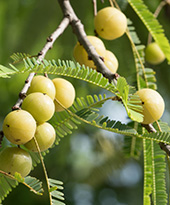06-12-2017
An Ayurvedic remedy: the natural benefits of Amla
 Amla is also known as Amalaki rasayana – a powerful Ayurvedic plant with regenerating properties. In India, Amalaki means ‘nurse’ and ‘rasayana’ refers to rejuvenation of the body. Long-used in Ayurvedic medicine for its protective and regenerating effects, Amla is today attracting scientific interest for its cardiovascular health benefits. Here we explore this growing interest with a review of the latest research on Amalaki rasayana and its many health benefits.
Amla is also known as Amalaki rasayana – a powerful Ayurvedic plant with regenerating properties. In India, Amalaki means ‘nurse’ and ‘rasayana’ refers to rejuvenation of the body. Long-used in Ayurvedic medicine for its protective and regenerating effects, Amla is today attracting scientific interest for its cardiovascular health benefits. Here we explore this growing interest with a review of the latest research on Amalaki rasayana and its many health benefits.
Amla’s multiple properties
The Ayurvedic remedy Amalaki rasayana is obtained from the fruit of the Amla (Phyllanthus emblica or Embilica officinalis), an Indian tree famous for its remarkable longevity. This fruit extract has been used by Ayurvedic practitioners for thousands of years as a tonic and natural rejuvenator. In Ayurvedic texts, Amla is associated with many therapeutic uses, including the treatment of cancer, diabetes, cardiovascular problems, liver disease and gastric ulcers1. Studies conducted on this powerful natural remedy suggest it has:
- antioxidant activity for fighting free radical damage;
- cytoprotective effects for protecting cells against multiple attacks;
- an immune-modulating action for boosting the body’s defences;
- cholesterol-lowering effects;
- gastro-protective properties for reducing stomach problems such as heartburn, ulcers and indigestion;
- analgesic effects for relieving certain types of pain;
- an antipyretic action for reducing fever;
- antitussive activity for soothing coughs.
For some years now, several research teams have also been investigating the cardio-protective properties of Amalaki rasayana. In 2004, scientists showed that recurrent administration of Amla improved myocardial antioxidant defences in rats2. Published in the journal Phytotherapy Research, their results suggest that regular supplementation with Amla increases antioxidant activity and protects cardiac function. In 2011, another study on rats which investigated the effects of this Ayurvedic remedy in combatting hypertension, revealed a decrease in oxidative stress and several cardio-protective effects3. Recent research published in the journal Scientific Reports expanded on these encouraging preliminary findings1. Here the authors monitored the effects of Amla supplementation on six groups of rats. They observed improvements in heart function in ageing rats, a decrease in left ventricular cardiac hypertrophy, and increases in both antioxidant capacity and expression of anti-hypertrophic markers. On the basis of these results, they concluded that Amla has a beneficial effect on myocardial energy function, muscle contractile function and exercise tolerance capacity.
As well as opening up promising new therapeutic perspectives, this latest research supports the preventive benefits of supplementing with Amla. Used for thousands of years as a tonic and natural rejuvenator, this Ayurvedic remedy is now available from the SuperSmart catalogue as the dietary supplement Double Amla.
> Sources :
1. Kumar V, et al., Amalaki rasayana, a traditional Indian drug enhances cardiac mitochondrial and contractile functions and improves cardiac function in rats with hypertrophy, Scientific Reports, 2017; 7:8588.
2. Rajak S, et al., Emblica officinalis causes myocardial adaptation and protects against oxidative stress in ischemic-reperfusion injury in rats, Phytotherapy Results, Janvier 2004; 18(1):54-60.
3. Bhatia J, et al., Emblica officinalis exerts antihypertensive effect in a rat model of DOCA-salt-induced hypertension: role of (p) eNOS, NO and oxidative stress, Cardiovascular Toxicology, Septembre 2011; 11(3):272-9.
Further reading
06-07-2019
If you haven’t yet come across the medicinal plant gymnema (Gymnema sylvestris) , you may be surprised by just how many health benefits it offers....
Read more28-06-2019
You’re no doubt familiar with the health benefits of turmeric. In addition to being a cooking ingredient, the plant Curcuma longa L. is widely used...
Read more29-04-2019
Have you heard of Triphala, the famous Ayurvedic formulation? Used for thousands of years for its detoxifying benefits, this combination of natural extracts has also...
Read more© 1997-2025 Fondation pour le Libre Choix
All rights reserved
All rights reserved
Free
Thank you for visiting our site. Before you go
REGISTER WITHClub SuperSmart
And take advantage
of exclusive benefits:
of exclusive benefits:
- Free: our weekly science-based newsletter "Nutranews"
- Special offers for club members only

















